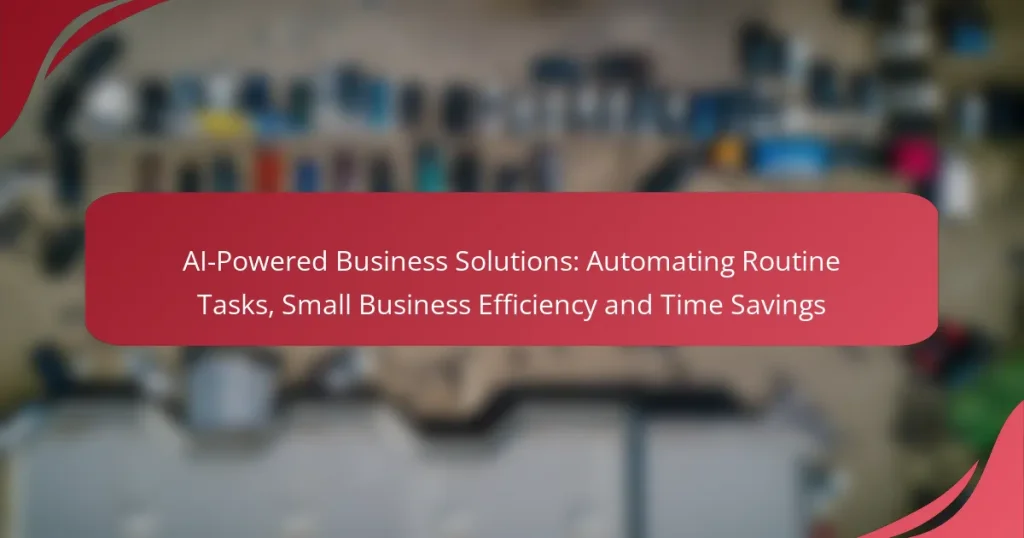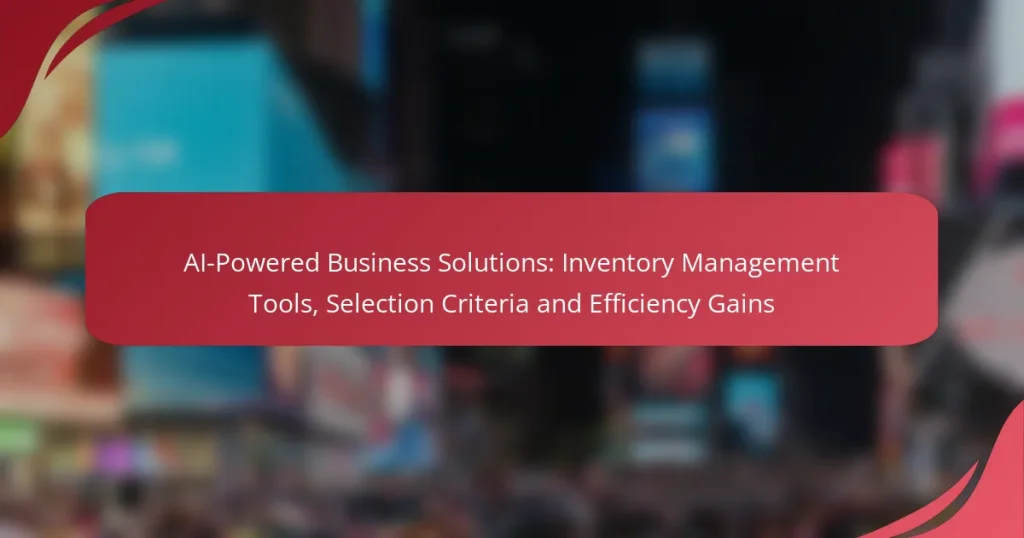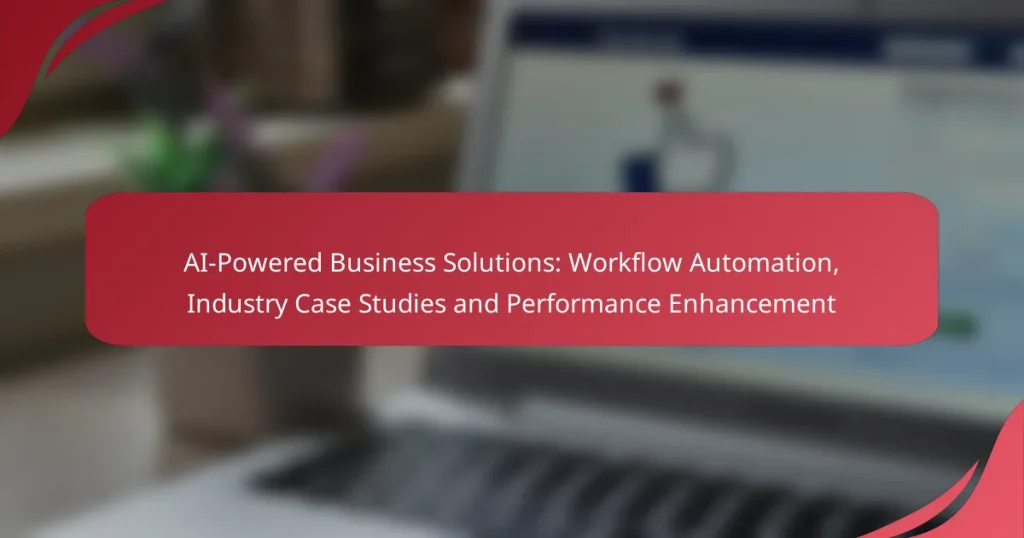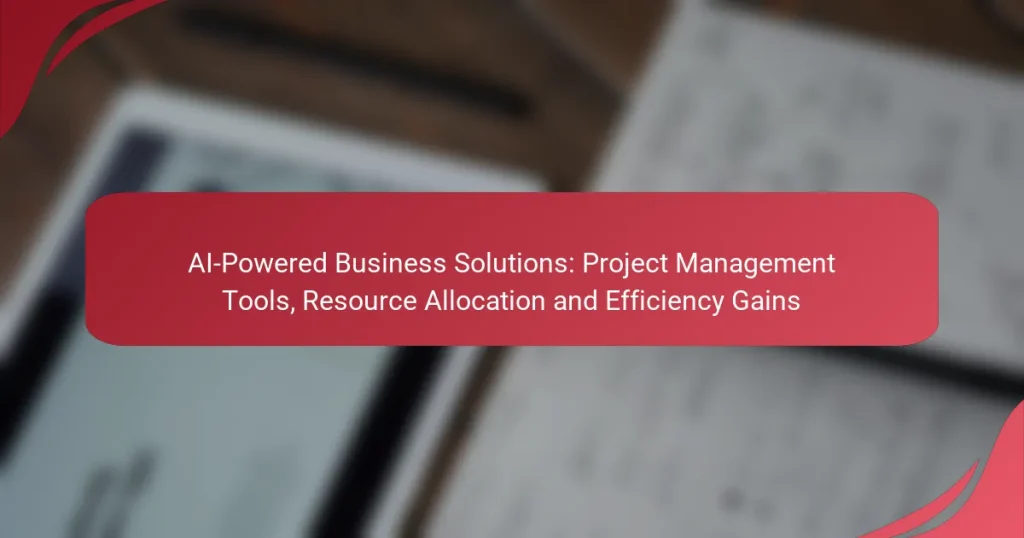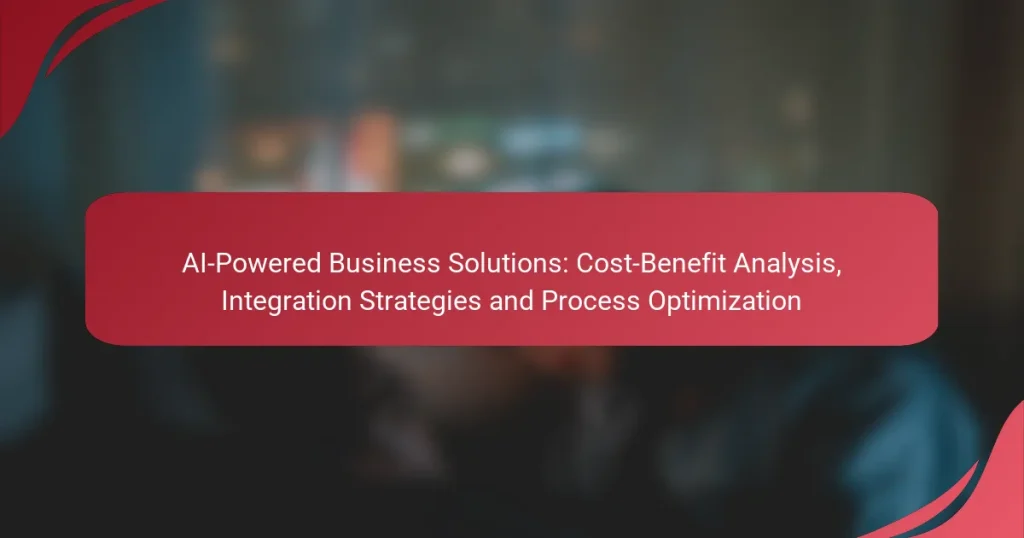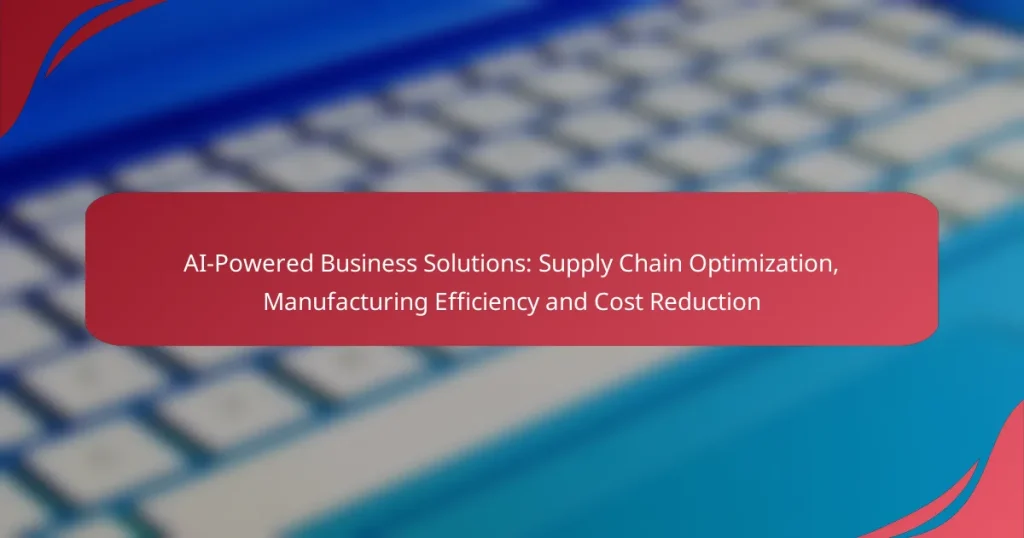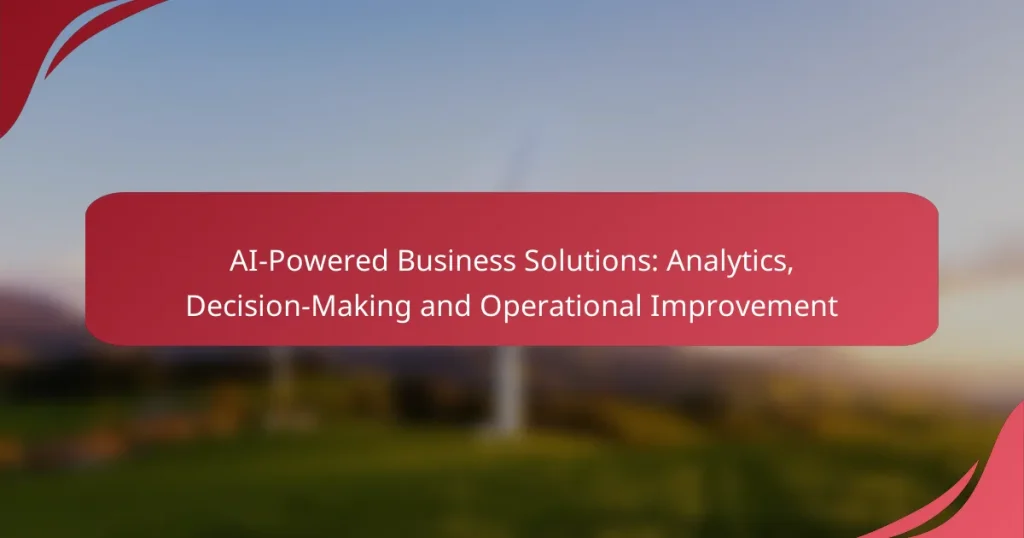AI-powered business solutions are revolutionizing the way companies operate by automating repetitive tasks and enhancing customer interactions. By leveraging data-driven insights, businesses can streamline their operations, reduce costs, and ultimately improve the customer experience. With tools like Shopify, Salesforce Einstein, and HubSpot, organizations can harness the power of AI to optimize their e-commerce strategies effectively.
AI-Powered Business Solutions: Inventory Management Tools, Selection Criteria and Efficiency Gains
AI-Powered Business Solutions: Workflow Automation, Industry Case Studies and Performance Enhancement
AI-Powered Business Solutions: Project Management Tools, Resource Allocation and Efficiency Gains
AI-Powered Business Solutions: Cost-Benefit Analysis, Integration Strategies and Process Optimization
AI-Powered Business Solutions: Supply Chain Optimization, Manufacturing Efficiency and Cost Reduction
AI-Powered Business Solutions: Analytics, Decision-Making and Operational Improvement
How can AI streamline e-commerce operations?
AI can significantly streamline e-commerce operations by automating repetitive tasks, enhancing customer interactions, and providing data-driven insights. This leads to improved efficiency, reduced costs, and a better overall shopping experience for customers.
Inventory management automation
AI-powered inventory management systems can predict stock levels, automate reordering processes, and minimize overstock situations. By analyzing sales trends and seasonal demand, these systems ensure that products are available when customers want them, reducing lost sales opportunities.
Consider implementing tools that integrate with your existing platforms to track inventory in real-time. This can help maintain optimal stock levels and reduce carrying costs, ultimately improving cash flow.
Customer service chatbots
Chatbots powered by AI can handle a large volume of customer inquiries simultaneously, providing instant responses to common questions. This not only improves customer satisfaction but also frees up human agents to focus on more complex issues.
When deploying chatbots, ensure they are trained on your product catalog and frequently asked questions. Regularly update their knowledge base to reflect new products or services, and monitor interactions to continuously improve their performance.
Sales forecasting tools
AI-driven sales forecasting tools analyze historical sales data and market trends to predict future sales performance. This allows businesses to make informed decisions regarding inventory, staffing, and marketing strategies.
Utilize these tools to identify patterns and seasonality in your sales data. Regularly review forecasts against actual sales to refine the accuracy of your predictions and adjust your strategies accordingly.
Personalized marketing solutions
AI can enhance marketing efforts by analyzing customer behavior and preferences to deliver personalized content and product recommendations. This targeted approach increases engagement and conversion rates, leading to higher sales.
Implement AI tools that segment your customer base and tailor marketing messages accordingly. A/B testing different campaigns can help identify the most effective strategies for your audience, maximizing your return on investment.
What are the benefits of AI in business?
AI in business offers numerous advantages, including improved efficiency, reduced costs, and enhanced customer experiences. By automating tasks and analyzing data, businesses can streamline operations and make informed decisions more quickly.
Increased efficiency
AI technologies can significantly boost operational efficiency by automating repetitive tasks and optimizing workflows. For instance, chatbots can handle customer inquiries 24/7, allowing human agents to focus on more complex issues.
Implementing AI solutions can lead to faster processing times, often reducing task completion from hours to minutes. Companies should assess their operations to identify areas where AI can automate tasks and improve overall productivity.
Cost reduction
AI can help businesses lower costs by minimizing the need for manual labor and reducing errors. For example, predictive maintenance powered by AI can prevent costly equipment failures by identifying issues before they escalate.
Organizations can save tens of thousands of dollars annually by integrating AI into their processes. However, it’s essential to evaluate the initial investment against long-term savings to ensure a positive return on investment.
Enhanced customer experience
AI enhances customer experience by providing personalized interactions and faster service. For example, recommendation engines can analyze customer behavior to suggest products tailored to individual preferences, increasing satisfaction and loyalty.
Businesses that leverage AI for customer insights can respond to inquiries more effectively, often resolving issues in real-time. To maximize benefits, companies should continuously gather feedback and refine their AI systems based on customer interactions.
Which AI tools are best for e-commerce?
Several AI tools are particularly effective for e-commerce, enhancing customer experience and optimizing operations. Key players include Shopify, Salesforce Einstein, and HubSpot, each offering unique features tailored to different business needs.
Shopify AI features
Shopify incorporates AI to improve various aspects of e-commerce, such as personalized product recommendations and automated customer support. Its AI-driven analytics help merchants understand customer behavior, enabling targeted marketing strategies.
For example, Shopify’s product recommendation engine can increase average order value by suggesting complementary items during the shopping process. Merchants should leverage these features to enhance user engagement and drive sales.
Salesforce Einstein
Salesforce Einstein is an AI tool that integrates seamlessly with Salesforce’s CRM, providing insights into customer interactions and sales forecasts. It uses machine learning to analyze data and suggest actions that can improve customer relationships and sales performance.
Businesses can utilize Einstein’s predictive analytics to identify high-value leads and tailor marketing campaigns accordingly. This targeted approach can significantly enhance conversion rates and customer retention.
HubSpot AI tools
HubSpot offers a suite of AI tools designed to streamline marketing, sales, and customer service processes. Its AI capabilities include chatbots for customer inquiries and predictive lead scoring to prioritize sales efforts effectively.
By implementing HubSpot’s AI tools, e-commerce businesses can automate routine tasks, allowing teams to focus on strategic initiatives. Regularly reviewing AI performance metrics can help businesses refine their strategies and improve overall efficiency.
How to choose the right AI solution?
Selecting the right AI solution involves understanding your specific business needs and how the technology can address them. Focus on compatibility with existing systems, scalability for future growth, and the overall impact on operational efficiency.
Assess business needs
Begin by identifying the specific challenges your business faces that AI could solve. This could range from automating repetitive tasks to enhancing customer service through chatbots. Clearly define your objectives to ensure the AI solution aligns with your strategic goals.
Consider conducting a needs assessment that includes input from various departments. This collaborative approach helps in understanding the unique requirements across your organization, ensuring that the selected AI solution meets diverse needs.
Evaluate integration capabilities
Integration capabilities are crucial when selecting an AI solution. Ensure that the AI technology can seamlessly connect with your existing systems, such as CRM or ERP platforms. This compatibility minimizes disruption and enhances data flow across your organization.
Look for solutions that offer APIs or pre-built connectors for popular software. This can significantly reduce implementation time and costs, allowing for a smoother transition and quicker realization of benefits.
Consider scalability
Scalability is vital for any AI solution, as your business needs may evolve over time. Choose a solution that can grow with your organization, accommodating increased data volume or additional features without requiring a complete overhaul.
Evaluate whether the AI solution can handle increased workloads and if it offers flexible pricing models. This ensures that as your business expands, your AI capabilities can expand accordingly, providing long-term value and efficiency.
What are common challenges in AI adoption?
Common challenges in AI adoption include data privacy concerns, high implementation costs, and employee resistance. Addressing these issues is crucial for businesses looking to integrate AI solutions effectively.
Data privacy concerns
Data privacy concerns are paramount when adopting AI technologies. Businesses must ensure compliance with regulations such as GDPR in Europe or CCPA in California, which mandate strict data handling practices. Failing to protect customer data can lead to significant legal repercussions and damage to reputation.
To mitigate these concerns, organizations should implement robust data governance frameworks. This includes anonymizing sensitive data, conducting regular audits, and ensuring transparency in data usage. Engaging with customers about how their data is used can also build trust.
High implementation costs
High implementation costs can deter companies from adopting AI solutions. Initial investments often include software licensing, hardware upgrades, and hiring specialized talent. These costs can range from thousands to millions of dollars, depending on the scale of the project.
To manage expenses, businesses can consider phased implementations or leveraging cloud-based AI services, which typically offer lower upfront costs. Additionally, seeking partnerships or grants can help offset financial burdens while still achieving AI integration.
Employee resistance
Employee resistance is a common barrier to AI adoption, as staff may fear job displacement or lack the necessary skills to work with new technologies. This resistance can hinder the successful implementation of AI solutions within an organization.
To overcome this challenge, companies should prioritize training and development programs that equip employees with the skills needed for AI integration. Communicating the benefits of AI, such as improved efficiency and new job opportunities, can also help alleviate fears and foster a more positive attitude towards change.
How does AI impact customer engagement?
AI significantly enhances customer engagement by personalizing interactions and automating responses. Through data analysis and machine learning, businesses can tailor their communications, improving customer satisfaction and loyalty.
Personalization through Data Analysis
AI utilizes customer data to create personalized experiences. By analyzing purchasing behavior and preferences, businesses can recommend products that align with individual interests. For instance, e-commerce platforms often use AI algorithms to suggest items based on past purchases, increasing the likelihood of additional sales.
Automated Customer Support
AI-driven chatbots and virtual assistants provide immediate responses to customer inquiries, streamlining support services. These tools can handle a wide range of questions, from order tracking to troubleshooting, often resolving issues without human intervention. This not only reduces wait times but also allows human agents to focus on more complex queries.
Predictive Analytics for Engagement Strategies
Predictive analytics powered by AI helps businesses anticipate customer needs and behaviors. By analyzing historical data, companies can identify trends and adjust their marketing strategies accordingly. For example, a retail business might predict seasonal demand for certain products, allowing for timely promotions and inventory management.
Challenges and Considerations
While AI enhances customer engagement, businesses must consider data privacy and ethical implications. Compliance with regulations like GDPR in Europe is crucial to ensure customer trust. Additionally, relying solely on AI can lead to a lack of human touch, which is essential for building strong customer relationships.
